![]()
The Words of the Goodman Family
|
|
The Words of the Goodman Family |
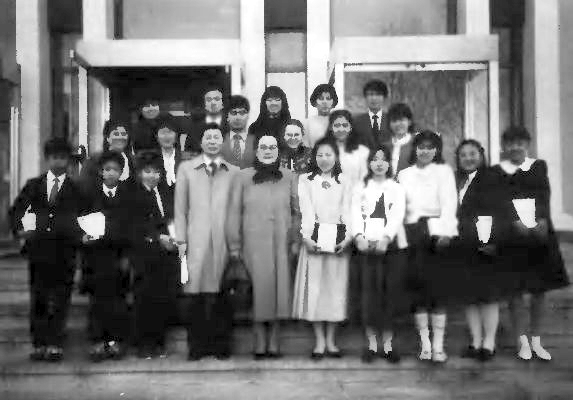
Mrs.
Won Pok Choi (center), the new director of the Institute of Korean
Study for Foreign Students, with some of the blessed children at the
Little Angels School.
Since 1984, Mark and Sharon Goodman, an 8,000 Blessed Couple, have been the parent figures for the Western blessed children (ages 12-18) studying at the Little Angels School in Korea. Below is Sharon's report about the great progress of the foreign students' educational program since it began in 1982.
For the international blessed children studying at the Little Angels School in Korea, 1988 has already proved to be a year of advancement. On February 15, 1988, the Institute of Korean Study for Foreign Students was founded by our True Parents. What had formerly been only a department at the Little Angels School has now become a bona fide institute for Korean study. At the inauguration ceremony, Dr. Bo Hi Pak announced the birth of this new institution as one branch of the Korean Cultural Foundation. As he shook our hands he leaned over to me with a smile and quietly said, "This is a step up, you know!"
Father, once again, has shown us how much of his thought and vision he is investing into the blessed children and the second generation. His love was shown by his appointing Mrs. Won Pok Choi, a most distinguished elder member of our church, to be the director (Won Jang Nim) of this new Institute. Mrs. Choi has always been recognized as a mother-figure to members all over the world. A former university professor, she has mastered the Korean, Japanese, and English languages; thus she can be a bridge between the East and the West. Through her loving guidance she will be the blessed children's direct connection to True Parents. Mrs. Choi plans to guide the children attending the Institute in matters of spiritual life, church traditions, and understanding the True Family. Mrs. Choi had served as principal of the Little Angels School from the beginning of our foreign students' program in Korea until her retirement last March. But Father didn't let her rest long! On the day of her inauguration as director of the Institute, she said, "I was shocked and surprised when Father called me to Han Nam Dong and gave me this new title. But in a way, I am not shocked because I have never stopped thinking about the children."
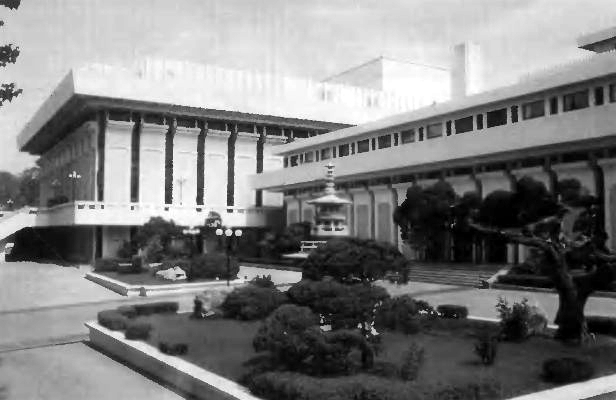
The
Little Angels Art School and Performing Arts Center, Seoul, Korea.
I would like to explain a little about the history of the international blessed students' program in Korea. In 1982 the three oldest Western blessed children in Europe came to study Korean at the Little Angels School -- Young Oon Orme from England, Helga Kunkel from Germany, and Johanna Van der Stok from the Netherlands (all children of the 43 Couples). They had the difficult task of being the "ice-breakers" to the East. There was no preparatory language study program at that time; they took regular classes along with the Korean students. They had no designated guardian but lived with several Western church families.
In 1983 two groups of blessed children came from Japan, as well as two more students from America -- Naeran Verheyan and Ichiko Sudo. They were tutored in the Korean language while at- tending regular classes at the school. Most of the students in this group are now in their second year of the Little Angels High School.
In 1984 the Spurgin family expressed the desire to send their eldest daughter, Andrea, to the program. On hearing that, Father asked that several other American blessed children also go, as well as two from Germany -- Goon Koch and Karin Kunkel. In addition, another group was sent from Japan. Since the Western program was to suddenly grow from four to 16 students, guardians were needed to help the Western students. At that time Mark and I were called to go to Korea to fill that capacity. I can remember we didn't know what to expect at all. The situation made me really admire those parents who had the bravery and faith to send their first-born children -- only 12 years of age -- away to school 8,000 miles from home.
That year was the first year of formal language training. The school provided the best it could, but honestly speaking, those beginning days were bleak ones. We all felt a little stranded and isolated, trying to adjust to such a 180-degree difference in culture. Mark and I spent more time protecting the children emotionally and spiritually than helping them fit in.
There was always the struggle to understand what to give up from our own cultures and what to adopt totally from the Korean way of life. Although life seemed "bare," that very element was the thing that helped each of us change and grow. There were no distractions as such.
The kids felt liberation in the Korean culture's purity; they didn't have to contend with the pressure they felt in American schools to go on dates, keep up with the latest fashions, etc. As time went on, we could see our students feel freer and more relaxed as they experienced just being themselves with each other. The Westerners really bonded together that year.
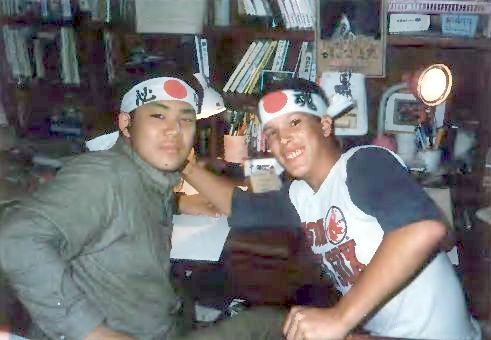
Matthew
Jones and Yokoi Masayuki, roommates at the International Blessed
Children's Dormitory.
By 1985, the older students had begun to speak the language. The Little Angels School prepared a 23-room dormitory for foreign students so that the Japanese and Western blessed children could live together in one house as brothers and sisters. Up until this year, the two programs had been separate, and the children lived in different houses with their own guardians. However, we had always felt that God's vision was for the Japanese and Western students to become one in this experience in Korea. We also felt the need to try to establish a heavenly pattern and tradition. It was a beginning!
In 1986 the Korean language program for newcomers was improved, and those entering the Little Angels School were better prepared than they had ever been. Since many of the older students were now becoming more fluent in Korean, we on the staff paired up Japanese and Western roommates -- encouraging more strongly the use of Korean as our common language and expanding the foundation of unity for the future. We saw close friendships developing between students whose parents had difficulty relating well with each other. Later that year, Mrs. Gertrud Koch (the wife of Peter Koch) was asked by Father to be in an elder's position in the dormitory. Her own strong life of faith and her many past experiences as the wife of a national leader added an important vertical support and a maturity to the program. There were the inevitable growth-stage struggles as German, Japanese, and American staff members worked to make unity among ourselves.
The year 1987 was a year of great spiritual guidance from Heung Jin Nim (through mediums). Both the staff and the students received daily spiritual dictations, leading up to what Heung Jin Nim called a "special event." That event was our Pentecost on July 7, 1987. Heavenly Father poured out His love on us that day, and Heung Jin Nim gave us the message that the Japanese and Western students definitely had to make unity before 1988! The next five months were a real adventure for the kids as they began reaching out to each other, really getting to know one another, throwing away their concepts about cultures, and overcoming their self-consciousness. It was especially difficult for the Japanese students to express themselves freely; and for the Westerners, going over the language barrier and trying to speak through the heart was the big challenge. We made monthly goals, and Mrs. Koch led us through prayer conditions. We also made several visits to Heung Jin Nim's Won Jun. Finally we could experience the freedom to love one another, and we were determined to hold onto that and keep it in the dormitory. Our goal was to create a house where God could live 24 hours a day.
As a finale to this whole drama, in December 1987 Heung Jin Nim (Black Heung Jin Nim [Cleophas / Cleopas Kundioni]) came personally to Korea to give guidance to all the blessed couples and later to all the blessed children 16 years and older.
This event was a major turning point for both staff members and our elder students. Our students said that for the first time they felt grateful to have had the chance to live together with other blessed children and to live a structured life of Principle study, prayer, and academic study. When they returned from Heung Jin Nim's conference the older students all felt confident and absolutely sure about the standard they wanted to keep.
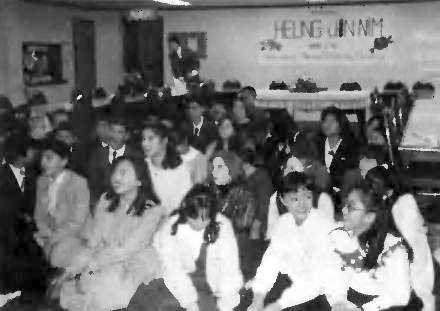
On
January 16, 1988, Heung Jin Nim (Black Heung Jin Nim [Cleophas /
Cleopas Kundioni]) visited the blessed children's dormitory. "Because
of the students' eager original minds and hearts, they could really
"soak in" Heung Jin Nim's Shim Jung."
The icing on the cake came on January 16, 1988, when Heung Jin Nim (Black Heung Jin Nim [Cleophas / Cleopas Kundioni]) paid a personal visit to our International Blessed Children's Dormitory. What a happy day! At last, all the students could experience Heung Jin Nim in the flesh! We arranged a pizza party followed by all sorts of games. The dormitory was on fire with enthusiasm. As a true elder brother, Heung Jin Nim interacted with the students in a very natural and high-spirited way. I realized how joyful the Kingdom of Heaven could be! Because of the students' eager original minds and hearts, they could really "soak in" Heung Jin Nim's Shim Jung.
Since that day all of us feel we've jumped to a new level. Now the older brothers and sisters -- both Japanese and Western -- gather frequently for personal prayer meetings on their own initiative. A large number of our students attend Father's 6:00 am speech every Sunday. From time to time Kook Jin Nim has been inviting the elder students to meet with him for talks. As True Parents' sons and daughters are taking their position as leaders of the second generation, we see that the blessed children are now eagerly following them -- absorbing quickly the True Children's passion to take responsibility as faithful sons and daughters of heaven. What an exciting opportunity to be participating in such a historical time! We are truly witnessing the maturing of the second generation.
Frankly speaking, many of our American students used to say to me, "Here in Korea I feel like I am a blessed child, but will I be able to keep this standard and this heart when I return to America and my old situation?" Now I can see that the children are all very strong. It's a beautiful thing to see the older brothers and sisters consciously striving for their self-perfection and taking responsibility for the younger ones.
So where do we go from here? We have a pattern, we have a new-born Institute, and were in a new year, but I think we will need to begin all over again at the formation stage, though on a whole new level. Our goal? The same as everyone's: to move into the universal world of heart -- God's Shim Jung.
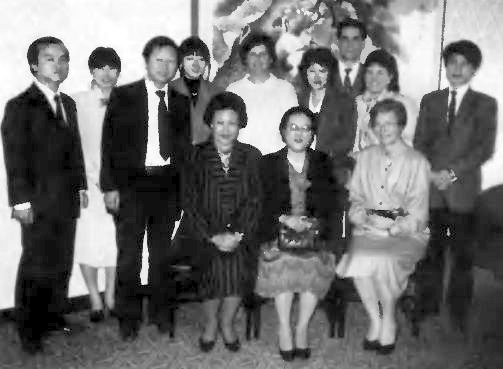
Teachers
and dormitory staff for the Western and Japanese blessed children.
Front row, left to right: Mrs. Woo, principal of the Little Angels
School; Mrs. Won Pok Choi; and Mrs. Gertrud Koch. Standing behind
Mrs. Koch are Sharon and Mark Goodman.
Who can be accepted into the foreign students' scholarship program at the Little Angels School? There are four basic qualifications: The student must: 1) be a blessed child with both parents in good standing in the church; 2) be at least 12 years of age and have completed the 6th grade; 3) have a good command of the English language (for the Western program); and 4) be emotionally and spiritually stable.
In the fall of 1988 there will be 88 foreign students, divided into two programs -- Western (represented by America, Austria, England, France, Germany, Norway, and the Netherlands), and Japanese. This year for the first time the program is being opened up to blessed children of Korean parents living in other countries.
Currently there is a Korean government restriction as well as dormitory space limitation as to how many foreign students can be accepted into the Little Angels School. Father has said that for the future, only one child per family should be chosen as a representative of their family to go to Korea, the criteria being the child who has the best ability to acquire the Korean language.
The General Orientation Program (GOP) is an 11-month course designed for the foreign blessed children when they first come. They are taught separately from the regular Korean student body. The GOP introduces the students to the Korean language and exposes them to the culture and customs of Korea. This is only an introductory program and does not presume that the student will automatically enter the Little Angels Art School in the future.
The Preparatory Course is an intensive Korean language study in preparation for entrance into the Little Angels Middle School. The Western program lasts 1 1/2 years; the Japanese program 1 year. Students are accepted into the Preparatory Course only by recommendation of their Korean language teachers, based on their language ability, academic performance during the GOP, and internal readiness.
The Middle School at the Little Angels Art School is a full curriculum middle school course (equivalent to junior high school) that lasts three years. Students attend the Little Angels School together with the regular Korean students. All courses are taught in Korean.
The High School at the Little Angels Art School (3 years) is for students planning a professional career in the arts. Acceptance into the high school requires passing the entrance examination.
Foreign students attending the Little Angels Art School are not required to take an art major. Those parents whose children have started art or music training previously and are interested in their child pursuing this at the Little Angels Art School should know that their child will be required to audition at the school to obtain an art scholarship.
For students who cannot pass this audition, or for students who wish to study art or music as a hobby, it will cost about $75 a month.
Visual Arts Drawing, painting, and sculpture
Classical Western Music Piano, violin, other classical instruments, and classical voice
Korean Traditional Music Kayageum (Korean traditional stringed instrument)
Dance Classical ballet (previous experience and audition required to be selected for study)